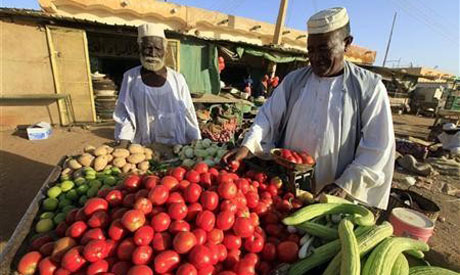
Vegetable-seller in the Sudanese capital, Khartoum (Photo: Reuters)
Sudan's annual inflation hit 30.4 per cent in May, accelerating from 28.6 per cent in April as prices for basic food items such as bread and meat climbed further, adding to woes of officials struggling to contain a severe economic crisis.
In an effort to curb the Sudanese pound's slide, the central bank also started allowing banks to trade currency at a rate closer to the one used on the widespread black market, bankers said on Wednesday.
The Arab-African country has avoided a popular uprising like Egypt or Syria but social pressures have been rising since Sudan lost much of its oil wealth when South Sudan became independent in July. In June 2011, inflation was 15 per cent.
The loss of oil revenues, which were the main source of state income and dollar inflows, has left officials scrambling to fund imports for most essential food items as Sudan produces little on its own.
To encourage millions of Sudanese sending remittances home Sudan last month allowed foreign exchange bureaux to use a devalued exchange rate to the dollar.
In a second step, the central bank has now allowed commercial banks to trade dollars at a rate close to the black market.
Western diplomats said the International Monetary Fund (IMF) had recommended the government devalue the pound to boost exports and close the gap with the black market, which has become a benchmark for firms.
Commercial banks started trading the dollar at a rate of around 4.9. This is slightly lower than rates between 5 and 5.1 used by licensed foreign exchange dealers. On the black market the rate stands at 5.4.
"They managed to narrow the spread to the black market but it's too early to say whether Sudanese abroad will send more dollars," said one banker.
The central bank, which could not be reached for comment, would keep the official exchange rate at 2.7 to fund imports of wheat and other essential food items, bankers said.
It is unclear how much foreign currency the central bank has available to defend the pound.
Local media quoted the central bank's deputy governor last month as saying the bank received a "large amount" of hard currency from abroad, but did not elaborate.
In September, the central bank governor asked fellow Arab countries to deposit $4 billion with the bank and commercial lenders.
Last week, the ruling party of President Omar Hassan al-Bashir unveiled plans to cancel fuel subsidies which would help plug the budget deficit but would also hit the poor.
Short link: